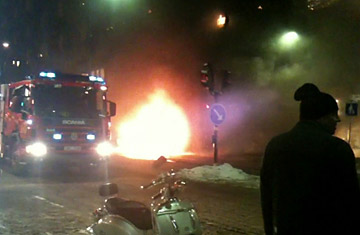
The December 11, suicide bombing in Stockholm, from a video camera.
The Dec. 29 arrest of five men suspected of plotting a deadly shooting siege in Denmark — just nine days after a dozen men were seized in Britain on suspicions they were preparing a bombing strike — offers further evidence that the high levels of alert across Europe are well-founded. But the flurry of recent news produced by European terror action also shows that, with the notable exception of the lone extremist who blew himself up in Stockholm on Dec. 11 in an apparently botched bombing, authorities seem to be catching more al-Qaeda-inspired plotters before they manage to attack. So what's behind that apparent success? Are security authorities getting better at picking off increasingly autonomous groups of disparate jihadists as they quietly ready for strikes? Or is it just that the public is hearing more about what's actually routine preventive activity?
The answer, officials say, is a little of both — with an assist from heightened alert levels that make security forces more inclined to move on suspects they've have under surveillance for a while. "The threat of attack is always higher during the holiday season, so services tend to move faster against groups they've already got under watch if it appears action might be on the way," says a French counter-terrorism official. "It's not a question of getting trigger happy, but rather gauging what you're hearing and seeing of radicals under observation [compared] to the generally higher risk you're facing. Sometimes there's more smoke than fire, other times you stamp out embers being fanned, and sometimes you stop what would have been a big blaze."
Though information on the Danish plot is limited, reports suggest the police halted what could have been a serious and imminent attack. Authorities say four of the suspects were picked up Wednesday in a suburb of Copenhagen after they'd been followed driving down from Sweden, where the fifth man was arrested. According to Jakob Scharf, head of Denmark's Security and Intelligence Service, the group was allegedly planning to attack the offices of Jyllands-Posten, the newspaper that sparked anger across the Muslim world in 2005 by printing caricatures of the Prophet Mohammed. Scharf said the men were hoping to carry out a "Mumbai-style" shooting spree and "clearly intended to kill as many people as possible". The suspects of diverse ages and nationalities are scheduled to face a hearing Thursday on preliminary charges of possession of illegal weapons and intent to commit terrorism.
The bust in Denmark is only the most recent in a series of anti-terrorism operations carried out across Europe in the past two months. On Nov. 23, coordinated sweeps in Belgium, the Netherlands, and Germany nabbed 11 people who were variously charged with plotting a strike in Belgium and recruiting members for international jihadist activity. In the Netherlands, meanwhile, one man remains in custody on suspicion of what authorities described as plans to stage an "imminent attack" — on Christmas Eve, 12 Somali suspects were arrested in connection with the plot; 11 have since been released or held for deportation. And on Dec. 27, nine of the 12 people apprehended in Wales, central England and London were formally charged with preparing bombing attacks of possible targets that included Big Ben, the London Stock Exchange, and the U.S. Embassy.
As was the case in nearly a dozen preventive sweeps across Europe in the past six weeks, the British action appeared to have begun with the identification of a diffuse group of individuals who didn't display the usual outward signs of increasing extremism, such as recent travel to al-Qaeda's have in Pakistan's tribal region, religious trips to Yemen, or contact with known radical groups or mosques. "A lot of the 'clients' we're seeing now are people who became radicalized, networked, and researched strategies and techniques of terror attack through the Internet," the French counter-terrorism official says. "The recent series of arrests of otherwise obscure and anonymous Islamists has been a result of improved surveillance of the Internet, and improving communication and sharing between European security forces."
In large party, that's a response to the realization that all Europe faces the same growing threat — even countries that, not long ago, didn't imagine themselves targets. Though virtually all European countries engage in activity that makes them an enemy of jihadists — whether participating in the war in Afghanistan, or making life hard on extremists at home — some believed they were less at risk of being attacked. "Their culture and self-perception of tolerance and harmony long left some northern European nations feeling less exposed than others," says the security official. Several recently disrupted plots in Denmark and Norway, the Dec. 11 bombing in Sweden, and Wednesday's arrests in Copenhagen have helped change that perception. And faced with that new reality, nations who once got comfort from the idea that they were among the few immune to terror attacks are now learning there's safety in numbers. "Over time they've seen the threat is just as great in their backyard as anywhere else," says the terror expert. "Which has made these countries become much more vigilant, and better partners in fighting terrorism."
